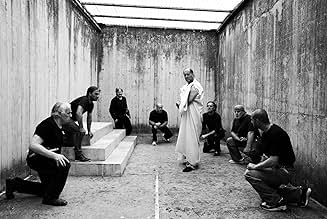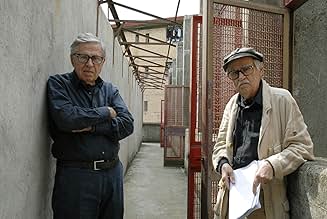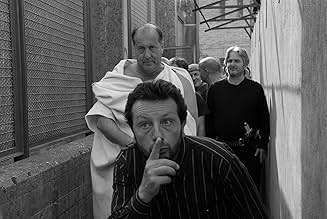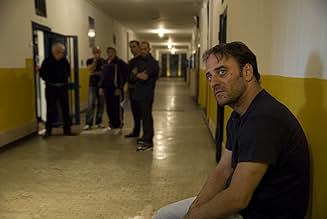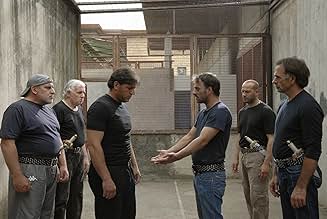NOTE IMDb
7,3/10
6,9 k
MA NOTE
Les détenus d'un quartier de haute sécurité d'une prison à Rome préparent une représentation publique du "Jules César" de Shakespeare.Les détenus d'un quartier de haute sécurité d'une prison à Rome préparent une représentation publique du "Jules César" de Shakespeare.Les détenus d'un quartier de haute sécurité d'une prison à Rome préparent une représentation publique du "Jules César" de Shakespeare.
- Réalisation
- Scénario
- Casting principal
- Récompenses
- 16 victoires et 21 nominations au total
Avis à la une
Taviani Brothers'2012 Golden Berlin Bear winner, saw the screening in this year's KVIFF, an intensely conceptual piece which recounts a play of "Julius Caesar"done by all-male prisoners. Shot entirely in Black & White, the film generates a certain art form extremity of blurring the boundary between play and film, and takes advantages of the indoor settings (which almost encompasses the entire film except for a few shots), the final result is gratifyingly diverting, both the film and the play-in-the-film.
I have only watched one Taviani Brothers' film before, ALLONSANFAN (1974, a 5/10). So I need to do more homework to comment on their style or expound on their near 60 years long walk- of-life. Simply single out this film, its artistic frontier has transcended other peers and condensed into a puristic absorption on the material itself, namely, the characters of the play and the individual prisoners who take on the roles, and strikingly their distinctions and similarities are undone in a yet refrained way. There are affluent theatrical nuisances in the film, although it only runs a scant 76 minutes, the film successfully conveys its ethos and every second counts.
Salvatore Striano stars the leading role as Bruto, his rough-edged dedication is imperfect but authentic, other supporters, the stand-outs are Cosimo Rega's Cassio and Juan Dario Bonetti's Decio, but by and large the amateur antics are put into the right place, and the absorbing original score by Giuliano Taviani and Carmelo Travia also lifts the film into a great adaption from Shakespeare's cannon. It's a true blessing to justify the fact that directors could surpass themselves even at their octogenarian years.
I have only watched one Taviani Brothers' film before, ALLONSANFAN (1974, a 5/10). So I need to do more homework to comment on their style or expound on their near 60 years long walk- of-life. Simply single out this film, its artistic frontier has transcended other peers and condensed into a puristic absorption on the material itself, namely, the characters of the play and the individual prisoners who take on the roles, and strikingly their distinctions and similarities are undone in a yet refrained way. There are affluent theatrical nuisances in the film, although it only runs a scant 76 minutes, the film successfully conveys its ethos and every second counts.
Salvatore Striano stars the leading role as Bruto, his rough-edged dedication is imperfect but authentic, other supporters, the stand-outs are Cosimo Rega's Cassio and Juan Dario Bonetti's Decio, but by and large the amateur antics are put into the right place, and the absorbing original score by Giuliano Taviani and Carmelo Travia also lifts the film into a great adaption from Shakespeare's cannon. It's a true blessing to justify the fact that directors could surpass themselves even at their octogenarian years.
I saw the world premiere of this movie at the Berlinale, where it won the golden bear last night. The movie is not bad, but also not special. The basic idea -real prison inmates play Shakespeares "Julius Caerar"- makes the movie interesting and the impressive acting makes you often forget, what fate those men face and what brought them to prison (murder, mafia-crimes etc). But since you know all that from the promotion already, the movie sometimes just leads up to watching an old Shakespeare-play, which we also already know. Just some philosophic aspects (at the end) and the idea of not showing the actual play, but the criminals only practicing it most of the time, is very entertaining.
Perhaps its the beautiful rolling sound of the Italian dialogue telling the story of Julius Cesar that made this enjoyable at least to the auditory sense. Perhaps it was that the language was sometimes amended to be more modern and meaningful. Perhaps it was the explained parallels of some of the prisoners experiences that helped to make the context more understandable. No matter, it was a thoroughly great way to start the Sydney Film Festival. The fact that this was a script within a script set in a prison using some real life prisoners didn't detract from anything in this film for me - I go to the cinema generally looking for a story, a fabrication, an unreality dressed in reality. I liked the gritty black and white, the sub-line of the prison life and setting. Yes, perhaps a prisoner saying he now felt caged etc didn't have to be said because it was obvious, but all in all a very enjoyable watch. I was engaged and participating from beginning to end. For me, one of the better versions of Julius/Shakespeare and a nice twist on an old but everlasting story.
Unable to snap up a ticket for this during Berlinale Film Festival (where it also won the grand prize), I've been itching to see Caesar Must Die (Cesare deve morire) for quite some time now. The latest from veteran Italian duo, Paolo and Vittorio Taviani (Padre Padrone, Kaos), it's a documentary-fiction hybrid observing the rehearsals and final performance of William Shakespeare's Roman masterpiece 'Julius Caesar'. What makes this movie noteworthy is it's idiosyncratic formalities: the play is being performed from Rome's high security Rebibbia Prison, and the players are it's incarcerated residents: an ensemble cast of murderers, drug dealers and thieves.
The brothers waste no time with needless exposition on the inmates' backstories or crimes. Instead, the pair focus, with brutal proximity, how these criminals connect with the words of "The Bard". Aside from the final, veracious performance, it's all shot in stylised black and white, as we see the production being set up, the rehearsals in the prison courtyard, and the delicate moments these wrongdoers spend behind cell bars. As is often the case with the Taviani's back-catalogue, there's moments filmed in tender close-ups; loading objects such as an empty chair or a wooden sword an implausible subtext.
That meta-narrative carries over to the inmates themselves, and ends up confusing us. Not only are they performers in the Shakespearean sense, it quickly becomes clear that they are being presented as poetical cyphers of their real life criminal selves. It's a shameful attempt at allegory – expressing how the elder words of Shakespeare relate to contemporary penal society, and in doing so removes any sense of empathy we would have otherwise had for the inmates.
Although the "play-within-a-film" gimmick is a good one, it's hardly original (Charlie Kaufman's Synecdoche, New York and Canadian filmmaker John Greyson's Lillies are both really worth a look). It's also not the best part of Caesar Must Die. With such astounding performances and beautiful adaptation of Shakespeare's words, one wishes that the Tatvianis abandoned the ostentatious stunts and luscious monochrome display, and instead focused plainly on documenting these ostracised people. An extraordinary, grotesque bunch, who find happiness, solidarity and hope in creative expression.
Read more reviews at www.366movies.com
The brothers waste no time with needless exposition on the inmates' backstories or crimes. Instead, the pair focus, with brutal proximity, how these criminals connect with the words of "The Bard". Aside from the final, veracious performance, it's all shot in stylised black and white, as we see the production being set up, the rehearsals in the prison courtyard, and the delicate moments these wrongdoers spend behind cell bars. As is often the case with the Taviani's back-catalogue, there's moments filmed in tender close-ups; loading objects such as an empty chair or a wooden sword an implausible subtext.
That meta-narrative carries over to the inmates themselves, and ends up confusing us. Not only are they performers in the Shakespearean sense, it quickly becomes clear that they are being presented as poetical cyphers of their real life criminal selves. It's a shameful attempt at allegory – expressing how the elder words of Shakespeare relate to contemporary penal society, and in doing so removes any sense of empathy we would have otherwise had for the inmates.
Although the "play-within-a-film" gimmick is a good one, it's hardly original (Charlie Kaufman's Synecdoche, New York and Canadian filmmaker John Greyson's Lillies are both really worth a look). It's also not the best part of Caesar Must Die. With such astounding performances and beautiful adaptation of Shakespeare's words, one wishes that the Tatvianis abandoned the ostentatious stunts and luscious monochrome display, and instead focused plainly on documenting these ostracised people. An extraordinary, grotesque bunch, who find happiness, solidarity and hope in creative expression.
Read more reviews at www.366movies.com
A week has passed since I watched "Cesare deve morire" and I am still trying to decipher the multiple layers on which this film has worked in my mind. The brothers Taviani have directed a masterpiece of 76' which however is so dense in content that the time is waxing inside one's own memory.
The Tavianis are documenting the mis-en-scene of a Shakespeare piece inside a prison. Probably the most impressive element of "Cesare deve morire" is the performances of the inmate actors. The fact that the film is shot as a documentary in its natural setting spreads the film in two layers which are seamlessly weaved on each other. On the first level we see the prisoners who are passionately rehearsing the lines of their characters and on the second level we stand on front of Cesar, Brutus and Antonius discussing in the alleys of Rome. As in the case of Bergman, the brothers Taviani are very successfully studying the relationship between theater and cinema.
This prison setting is extremely symbolic and renders the actor performances utterly intense. It feels as if the prisoners, lacking their physical freedom, are getting deep into the skin of those new personas seeking the experiences which prison has deprived them of. The performances are so convincing that one has to contemplate on the nature of human destiny. Could it be that one's social condition or even coincidences could make the same persons capable of the best and of the worst? Moreover, the film leads to an unavoidable rumination of the concept of freedom in all its forms.
A stark black and white photography pronounces the prison architecture and recreates ancient Rome in its bare corridors. The photography is perfectly self-standing and it would be of great artistic value even in the absence of a plot. The black and white may emphasize the lack of freedom of the inmates but also allows the spectator to ignore redundant information and to concentrate on the performances of the actors. It is remarkable how architectural beauty arises even in a prison. The common spaces are illustrated exceptionally well and after a while one feels lost in a limbo between the prison and Rome.
Finally, although the audience reaches catharsis after the end of Shakespeare's narration the narration of brothers Taviani remains unresolved into ones psyche. I personally believe that "Cesare deve morire" is one of those rare cinematic experiences that are capable to shake away well entrenched beliefs. That alone would make the film worth seeing. Gladly, those 76' are so much more.
The Tavianis are documenting the mis-en-scene of a Shakespeare piece inside a prison. Probably the most impressive element of "Cesare deve morire" is the performances of the inmate actors. The fact that the film is shot as a documentary in its natural setting spreads the film in two layers which are seamlessly weaved on each other. On the first level we see the prisoners who are passionately rehearsing the lines of their characters and on the second level we stand on front of Cesar, Brutus and Antonius discussing in the alleys of Rome. As in the case of Bergman, the brothers Taviani are very successfully studying the relationship between theater and cinema.
This prison setting is extremely symbolic and renders the actor performances utterly intense. It feels as if the prisoners, lacking their physical freedom, are getting deep into the skin of those new personas seeking the experiences which prison has deprived them of. The performances are so convincing that one has to contemplate on the nature of human destiny. Could it be that one's social condition or even coincidences could make the same persons capable of the best and of the worst? Moreover, the film leads to an unavoidable rumination of the concept of freedom in all its forms.
A stark black and white photography pronounces the prison architecture and recreates ancient Rome in its bare corridors. The photography is perfectly self-standing and it would be of great artistic value even in the absence of a plot. The black and white may emphasize the lack of freedom of the inmates but also allows the spectator to ignore redundant information and to concentrate on the performances of the actors. It is remarkable how architectural beauty arises even in a prison. The common spaces are illustrated exceptionally well and after a while one feels lost in a limbo between the prison and Rome.
Finally, although the audience reaches catharsis after the end of Shakespeare's narration the narration of brothers Taviani remains unresolved into ones psyche. I personally believe that "Cesare deve morire" is one of those rare cinematic experiences that are capable to shake away well entrenched beliefs. That alone would make the film worth seeing. Gladly, those 76' are so much more.
Le saviez-vous
- AnecdotesPaolo and Vittorio Taviani heard about the prisoners acting program and contacted Fabio Cavalli with the idea of doing Shakespeare's play and shot the whole experience.
- ConnexionsFeatured in Film '72: Épisode datant du 27 février 2013 (2013)
Meilleurs choix
Connectez-vous pour évaluer et suivre la liste de favoris afin de recevoir des recommandations personnalisées
- How long is Caesar Must Die?Alimenté par Alexa
Détails
- Date de sortie
- Pays d’origine
- Sites officiels
- Langue
- Aussi connu sous le nom de
- Caesar Must Die
- Lieux de tournage
- Sociétés de production
- Voir plus de crédits d'entreprise sur IMDbPro
Box-office
- Montant brut aux États-Unis et au Canada
- 76 908 $US
- Montant brut mondial
- 1 567 339 $US
- Durée1 heure 17 minutes
- Couleur
- Mixage
- Rapport de forme
- 1.85 : 1
Contribuer à cette page
Suggérer une modification ou ajouter du contenu manquant

Lacune principale
By what name was César doit mourir (2012) officially released in India in English?
Répondre

